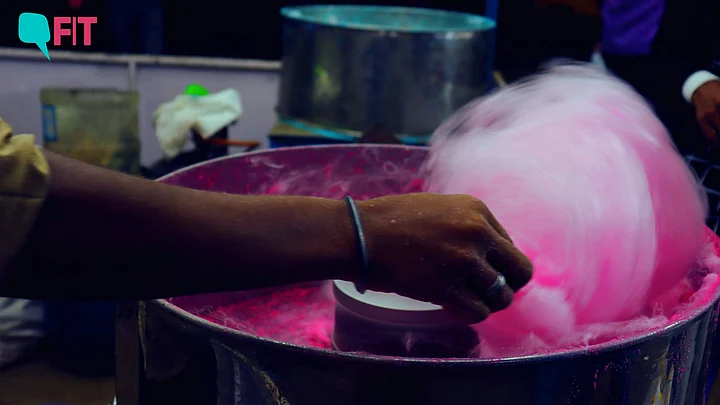Days after Tamil Nadu and Puducherry imposed a ban on cotton candy, the Andhra Pradesh government has asked officials to do sample testing.
Lasr week, Tamilisai Soundararajan, Lieutenant Governor of Puducherry took to her personal Instagram handle to urge people not to buy cotton candy, particularly for kids, as it contains toxic chemicals.
"People should be aware that food items having colour additives must not be given to children," she said in the video.
However, there is more to it. FIT answers your FAQs.
Why was the ban on cotton candy imposed in Puducherry?
Lieutenant Governor Soundararajan issued an order on Saturday, 10 February, stating that food safety officials tested and found the presence of a harmful chemical called ‘Rhodamine-B’ in the cotton candy being sold in the Union Territory.
In the video appeal, Soundararajan said, "We have directed officials to inspect shops that are selling cotton candies, and they will be seized if the presence of this toxic substance is found in the cotton candies."
Speaking to FIT, Dr Abhishek Gupta, a Paediatrics in Manipal Hospital, Gurugram, said, "It doesn't matter if a person consumes a small or large quantity, Rhodamine B is poison and it will have the same effects regardless of the amount consumed."
What is Rhodamine-B? Why is it used in cotton candy?
Rhodamine-B is a synthetic dye commonly used in various industries for its vibrant pink-to-red colour and fluorescent properties. These are extensively used in textiles, inks, and cosmetics.
In India, it is often used illegally in food products as a cheaper food colouring agent. This practice is particularly prevalent in some regions where food safety regulations may not be strictly enforced.
"Rhodamine B is not only found in cotton candy but also in many other processed foods such as sweets, coloured candies, red chillies, chili powder, curry powder, sauces, and many more, where its bright red colour can be used to deceive consumers or enhance the visual appeal of the product," Anu Gupta, A dietician in Miracle Hospital, Gurugram tells FIT.
Why is it considered toxic?
Rhodamine B has several side effects on the human body, especially if ingested in large quantities over a short period of time.
According to experts,it has carcinogenic properties, which can increase the risk of cancer development. Additionally, it is also linked with adverse effects on the liver and kidneys.
Anu Gupta says,
"It has numerous neurological side effects, including confusion and memory loss, which manifest slowly over time. Not only children but also adults should never consume anything containing this food colouring."
What are some physical symptoms associated with the toxic substance?
According to experts FIT spoke to, Rhodamine-B poisoning can present as the following symptoms.
Skin irritation – redness, itching, and rashes
Eye irritation – redness, watering, and discomfort (if it comes in direct contact with the eyes)
Nausea and vomiting
Sharp or cramping abdominal pain, accompanied by discomfort or bloating
Yellowing of the skin (jaundice)
Symptoms of allergic reactions such as hives, swelling of the face, lips, tongue, or throat, and difficulty breathing
When will the ban in Puducherry be lifted?
According to Lieutenant Governor Soundararajan, sellers will be permitted to continue selling cotton candy if they obtain a quality certificate from the food safety department.
Soundararajan emphasized the importance of obtaining the certification swiftly to expedite business operations. Until then,she said, the sale of cotton candy remains prohibited.
Are other states taking similar action to crack down on the use of Rhodamine-B in food products?
The ban extends to other cities and states. Food safety officials in Tamil Nadu have reportedly conducted raids on cotton candy shops in prominent locations in Chennai where they are sold, like Marina Beach and Elliot Beach, highlighting broader concerns regarding cotton candy safety.
Furthermore, Kerala State Health Minister, Veena George has also said that facilities in Kerala will be subject to raids by the department, reported Mathrabhumi.
A state special task force has, reportedly, been established in Kerala to conduct these operations and combat food adulteration.
In the meantime, how can I keep myself and my children safe?
Identifying foods containing Rhodamine B can be very challenging, especially when food colouring are used in most packaged food items.
However, according to Dr Shalini G, a Nutrition expert from Manipal hospital, Gurugram, keeping these tips and tricks in mind can help protect you from the side effects of Rhodamine B.
Check the ingredient lists on food packaging.
"Rhodamine B is not always listed by name, but it can be listed under other categories. Look for terms like 'colour additive' or specific colour names, such as "red dye" or "FD&C Red No. 3."Dr Shalini G
Minimize consumption of processed food.
Be wary of foods that have unnaturally vibrant colours, especially if they're red or pink.
Look for food products that have been certified by reputable organizations for their safety and quality. These certifications often indicate that the product has undergone testing for harmful additives.

